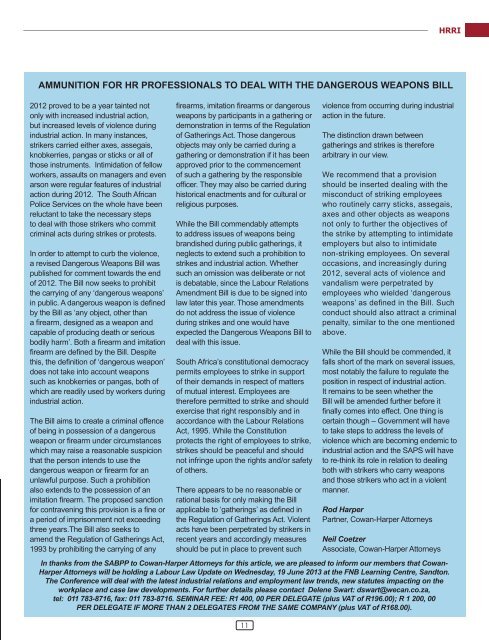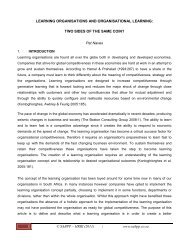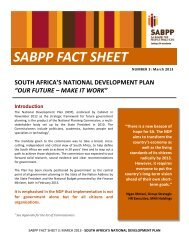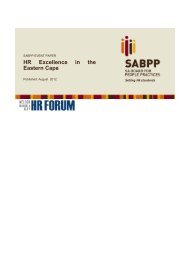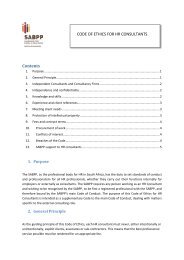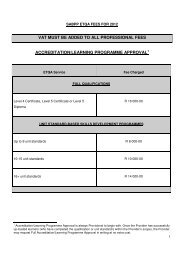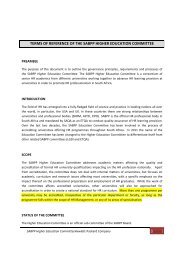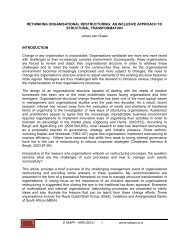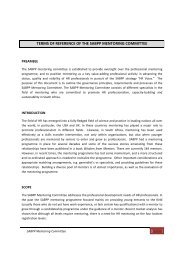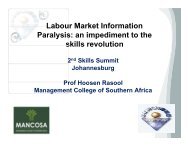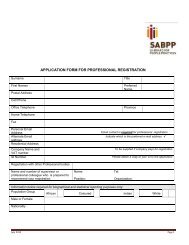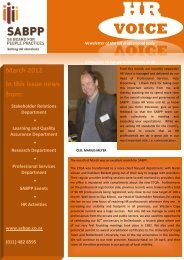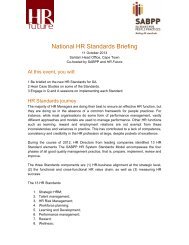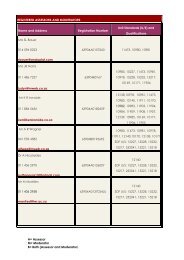SABPP HR Voice FINAL 310513.pdf
SABPP HR Voice FINAL 310513.pdf
SABPP HR Voice FINAL 310513.pdf
- No tags were found...
Create successful ePaper yourself
Turn your PDF publications into a flip-book with our unique Google optimized e-Paper software.
hrriAMMUNITION FOR <strong>HR</strong> PROFESSIONALS TO DEAL WITH THE DANGEROUS WEAPONS BILL2012 proved to be a year tainted notonly with increased industrial action,but increased levels of violence duringindustrial action. In many instances,strikers carried either axes, assegais,knobkerries, pangas or sticks or all ofthose instruments. Intimidation of fellowworkers, assaults on managers and evenarson were regular features of industrialaction during 2012. The South AfricanPolice Services on the whole have beenreluctant to take the necessary stepsto deal with those strikers who commitcriminal acts during strikes or protests.In order to attempt to curb the violence,a revised Dangerous Weapons Bill waspublished for comment towards the endof 2012. The Bill now seeks to prohibitthe carrying of any ‘dangerous weapons’in public. A dangerous weapon is definedby the Bill as ‘any object, other thana firearm, designed as a weapon andcapable of producing death or seriousbodily harm’. Both a firearm and imitationfirearm are defined by the Bill. Despitethis, the definition of ‘dangerous weapon’does not take into account weaponssuch as knobkerries or pangas, both ofwhich are readily used by workers duringindustrial action.The Bill aims to create a criminal offenceof being in possession of a dangerousweapon or firearm under circumstanceswhich may raise a reasonable suspicionthat the person intends to use thedangerous weapon or firearm for anunlawful purpose. Such a prohibitionalso extends to the possession of animitation firearm. The proposed sanctionfor contravening this provision is a fine ora period of imprisonment not exceedingthree years.The Bill also seeks toamend the Regulation of Gatherings Act,1993 by prohibiting the carrying of anyfirearms, imitation firearms or dangerousweapons by participants in a gathering ordemonstration in terms of the Regulationof Gatherings Act. Those dangerousobjects may only be carried during agathering or demonstration if it has beenapproved prior to the commencementof such a gathering by the responsibleofficer. They may also be carried duringhistorical enactments and for cultural orreligious purposes.While the Bill commendably attemptsto address issues of weapons beingbrandished during public gatherings, itneglects to extend such a prohibition tostrikes and industrial action. Whethersuch an omission was deliberate or notis debatable, since the Labour RelationsAmendment Bill is due to be signed intolaw later this year. Those amendmentsdo not address the issue of violenceduring strikes and one would haveexpected the Dangerous Weapons Bill todeal with this issue.South Africa’s constitutional democracypermits employees to strike in supportof their demands in respect of mattersof mutual interest. Employees aretherefore permitted to strike and shouldexercise that right responsibly and inaccordance with the Labour RelationsAct, 1995. While the Constitutionprotects the right of employees to strike,strikes should be peaceful and shouldnot infringe upon the rights and/or safetyof others.There appears to be no reasonable orrational basis for only making the Billapplicable to ‘gatherings’ as defined inthe Regulation of Gatherings Act. Violentacts have been perpetrated by strikers inrecent years and accordingly measuresshould be put in place to prevent such11violence from occurring during industrialaction in the future.The distinction drawn betweengatherings and strikes is thereforearbitrary in our view.We recommend that a provisionshould be inserted dealing with themisconduct of striking employeeswho routinely carry sticks, assegais,axes and other objects as weaponsnot only to further the objectives ofthe strike by attempting to intimidateemployers but also to intimidatenon-striking employees. On severaloccasions, and increasingly during2012, several acts of violence andvandalism were perpetrated byemployees who wielded ‘dangerousweapons’ as defined in the Bill. Suchconduct should also attract a criminalpenalty, similar to the one mentionedabove.While the Bill should be commended, itfalls short of the mark on several issues,most notably the failure to regulate theposition in respect of industrial action.It remains to be seen whether theBill will be amended further before itfinally comes into effect. One thing iscertain though – Government will haveto take steps to address the levels ofviolence which are becoming endemic toindustrial action and the SAPS will haveto re-think its role in relation to dealingboth with strikers who carry weaponsand those strikers who act in a violentmanner.Rod HarperPartner, Cowan-Harper AttorneysNeil CoetzerAssociate, Cowan-Harper AttorneysIn thanks from the <strong>SABPP</strong> to Cowan-Harper Attorneys for this article, we are pleased to inform our members that Cowan-Harper Attorneys will be holding a Labour Law Update on Wednesday, 19 June 2013 at the FNB Learning Centre, Sandton.The Conference will deal with the latest industrial relations and employment law trends, new statutes impacting on theworkplace and case law developments. For further details please contact Delene Swart: dswart@wecan.co.za,tel: 011 783-8716, fax: 011 783-8716. SEMINAR FEE: R1 400, 00 PER DELEGATE (plus VAT of R196.00); R 1 200, 00PER DELEGATE IF MORE THAN 2 DELEGATES FROM THE SAME COMPANY (plus VAT of R168.00).


